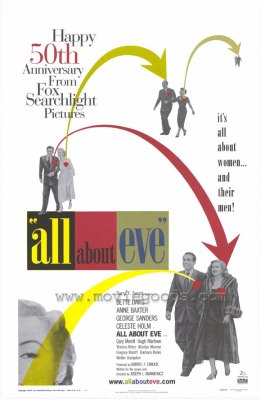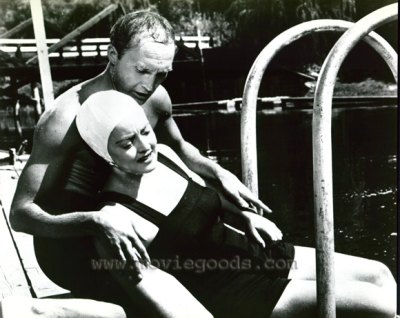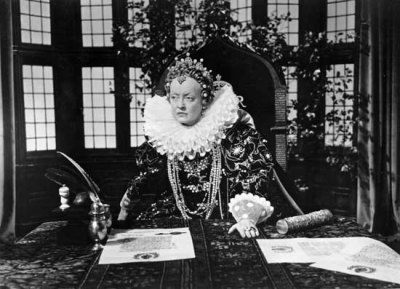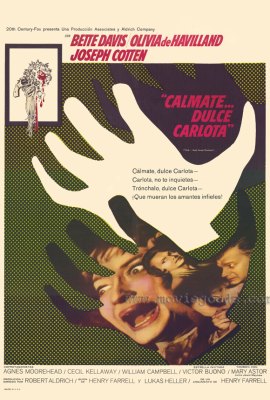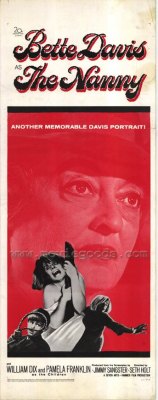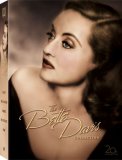| Reviews & Columns |
|
Reviews DVD TV on DVD Blu-ray 4K UHD International DVDs In Theaters Reviews by Studio Video Games Features Collector Series DVDs Easter Egg Database Interviews DVD Talk Radio Feature Articles Columns Anime Talk DVD Savant Horror DVDs The M.O.D. Squad Art House HD Talk Silent DVD
|
DVD Talk Forum |
|
|
| Resources |
|
DVD Price Search Customer Service #'s RCE Info Links |
|
Columns
|
|
|
Bette Davis Collection (All About Eve/Phone Call from a Stranger/The Virgin Queen/Hush...Hush, Sweet Charlotte/The Nanny), The
All About Eve
"What a story! Everything but the bloodhounds snappin' at her rear end!"
One of the most entertainingly cynical movies about unscrupulous ambition and perhaps the best-ever insider look at the Broadway theater scene, All About Eve is one of the all-time greats, a classic Hollywood movie eminently accessible even to those who normally don't watch old movies. (Ironically, it was released the same year as the arguably superior, similar Sunset Boulevard, whose even darker cynicism about West Coast show business - Hollywood - likewise hasn't aged a bit.)
Written and directed by Joseph L. Mankiewicz (adapted from Mary Orr's story), a big part of the reason All About Eve works so well is how ingeniously the film is set into motion, with a brilliant prologue that hooks viewers from the opening line of dialogue. At an awards dinner honoring the highest achievements of Broadway's previous season, actress Eve Harrington (Anne Baxter) is hailed as the Great White Way's latest discovery, yet amid all the thunderous applause five onlookers watch with curious detachment: temperamental, insecure 40-something star Margo Channing (Davis); playwright Lloyd Richards (Hugh Marlowe) and his wife, Karen (Celeste Holm); director Bill Sampson (Gary Merrill), Margo's much younger boyfriend; and self-important, acid-tongued theater critic Addison DeWitt (George Sanders).
In flashback the various characters reveal all about Eve, publicly the overnight sensation whose adoration of Margo, passion for the theater, tragic past (she's a war widow), and irrepressibly self-effacing manner ingratiates herself with Margo's group - they adopt her like a lost puppy - and later with Addison DeWitt.
It's a practically perfect movie in every way, from the juicy, highly quotable dialogue and ambitious, complex character relationships to the great performances and myriad fascinating connections between the characters and the people who created them, from Mankiewicz's semi-biographical portrait of both his famous writer brother Herman and himself in Sanders' character, to the parallels between Margo and Bill and Davis and Merrill, who married for real shortly before All About Eve's premiere.
Davis gives probably the best performance of her career, one somewhat unfortunately regarded as camp today ("Fasten your seat belts - it's going to be a bumpy night!"), in as much as it has been adopted by gay film fans, female impersonators in particular. Yet the greatness of her performance goes way beyond the Bette-Davisy delivery of all that great dialogue. What's most memorable is Margo's fragility beneath that steely veneer: she's terrified of growing older, how it will affect her career and, eventually, perhaps drive her younger boyfriend away. It's obvious Davis is bringing a lot of herself into the performance, not in an Actors Studio kind of way perhaps, but inescapable nonetheless.
(Mild Spoilers) Davis is also superb in her scenes with Baxter once Margo begins to suspect and later is convinced that Eve's motives are less than pure. Few could deliver sarcastic lines as well as Davis, except maybe William Holden, then of course making a splash in Billy Wilder's aforementioned film. Ironically, Baxter's work teeters far more precariously toward camp; her husky, very theatrical delivery even when she's supposed to be mousy is one of the film's few weaknesses. She gives the character away too soon, and late in the film, particularly during her temper tantrum with Addison, she's almost bad; only the fact that Eve herself is always "on," always acting, more or less, makes it work. (Did Mankiewicz recognize Baxter's shortcomings when he cast her, perhaps?)
The same could almost be said of Hugh Marlowe, a likeable but stiff actor who comes off better here than in other films precisely because his character is supposed to be a bit of stiff himself, someone less than charismatic: the brilliant playwright who's witless in person. All About Eve secured lifelong "character star" status for Thelma Ritter (as Davis's worldly-wise dresser/wardrobe woman) and George Sanders, who'd become typecast as suavely menacing types with that pithy, melliferous voice, a beguiling blend of honey and strychnine. (*****)
Phone Call from a Stranger
Though it barely qualifies as a Bette Davis movie - she doesn't turn up until 19 minutes before it's over - Phone Call from a Stranger is nevertheless a fascinating, somewhat unusual film, part of a peculiar sub-genre popularized with A Letter to Three Wives (1949). Second-billed Gary Merrill is the real star of the picture as David Trask, an attorney who walks out on his wife (Helen Westcott) and family after learning of her infidelity. Boarding a plane to Los Angeles he becomes friendly with three fellow passengers: aspiring but unsuccessful actress Bianca "Binky Gay" Carr (Shelley Winters, top-billed), alcoholic doctor Robert Fortness (Michael Rennie), and thoroughly obnoxious traveling salesman Eddie Hoke (Keenan Wynn).
(Mild Spoilers) When their plane crashes and Trask is one of the very few survivors*, he's compelled to visit the families of his three acquaintances. He tries to bring comfort and closure to Fortness's wife (Beatrice Straight, in her film debut) and bitter son (Ted Donaldson); amuses himself by tormenting Binky's minor Vaudeville star mother-in-law (Evelyn Varden), a disagreeable old has-been; and learns a surprising piece of information about annoying Eddie Hoke from his bed-ridden wife (Davis, who appropriately gets an "Also Starring" credit at the end of the cast list).
Merrill, a fine actor and craggily handsome in the early '50s (his looks went fast, however, and by the end of the decade was reduced to character parts), was still riding the success of All About Eve and, one supposes, his marriage to Davis, at the time something like a Taylor-Burton arrangement. (It's odd Fox chose this for the set rather than Another Man's Poison, in which Davis shared more screentime with Merrill.)
He's perfectly cast here, with Trask brooding in the kind of internalized way Merrill did especially well, and the screenplay by Nunnally Johnson and I.A.R. Wylie offers him realistic, reasonable reactions to her contriteness and motivations for his early aimlessness and later his compulsion to meet with the families of the crash victims.
The Rennie segment, with Fortness a drunk driver who lies his way out of a manslaughter charge only to ruin his relationship with his family in the years that follow, is okay. Rennie and Donaldson aren't believable as distant cousins, let alone father and son, though Straight's fine performance and her scenes with Merrill make it work in the end.
Trask's visit to Varden's hokey nightclub is interesting but odd. She's great as the eager-to-please Vaudevillian who becomes a monster offstage, but the segment jarringly shifts gears into some weirdly misplaced satire, in imagined flashbacks wildly out of synch with the mood of the rest of the picture.
The Bette Davis sequence is by far the best, if also melodramatic in the extreme. It's the kind of thing that will either suck you in - culminating in a final, unusual fade out with Merrill that's quite satisfying if you let it work its magic - or you'll find it incredibly corny. (It worked for me.) Davis gives an interesting, unusually subdued and philosophical performance, partly to contrast Wynn's tiresome clown, and partly because of her character's physical limitations. She's not in the film all that much, but arguably she and Merrill are even better in this than they were in All About Eve, though the film itself isn't as good. (****)
The Virgin Queen
Originally conceived as Walter Raleigh and a vehicle for co-star Richard Todd, once Davis was signed to reprise her role as Elizabeth I (first having done so in 1939's The Private Lives of Elizabeth and Essex, a Warner Bros. production), the picture's center of gravity inexorably shifted toward her, in what was Davis's first film in three years. It also seems likely Fox may have wanted to cash in on America's recent fascination with British royalty in the wake of Elizabeth II's June 1953 coronation.
The film traces the ambitious Raleigh's tempestuous relationship with Elizabeth, he currying her favor to win support for a New World voyage while secretly loving one of the Queen's wards, Beth Throgmorton (Joan Collins, quite good in her second-released Hollywood film).
The Virgin Queen is very much an early CinemaScope production: lots of pageantry and color and ultra-wide screen compositions and (yippee!) aggressive, fully-directional dialogue. Except for a few matte shots, one impressive but under-utilized miniature set, and some brief swordplay it is, conversely, short on action. That's because the screenplay is essentially a not-bad personal/political historical drama, more in keeping with Fox's very different pre-CinemaScope movies which, generally, were superior to the CinemaScope ones from the middle 1950s.
Bette Davis is indulgent but utterly captivating. It's almost like she mistakenly thought she was playing Blackbeard the Pirate: she swaggers outrageously like a drunk Falstaff, indelicately puts her feet on her desk when swapping stories with Raleigh, and roles those fried egg eyes like runaway yolks on an oily plate. Her New England accent and clipped speech, in overdrive here, complement the British and Irish cast. (And Australian: Rod Taylor's in the movie somewhere, though I didn't spot him.)
This reviewer had wanted to see The Virgin Queen for years for an unusual reason. Some years ago I was viewing a videotape of the 1955 Academy Awards, when Bette Davis suddenly turned up as a presenter. The audience gasped - and no wonder. Decked out like the Devil Girl from Mars she wore a kind of extra-terrestrial headpiece that might have been designed by Dr. Seuss and - as it turns out for her role in The Virgin Queen - had gamely shaved not only her eyebrows but at least a good portion of her scalp.
Director Henry Koster does a better than workmanlike job infusing the film with plenty of widescreen Elizabethan atmosphere. The supporting cast is decent enough for what essentially is a three-character piece. Jay Robinson, so campily over-the-top as Caligula in The Robe and Demetrius and the Gladiators, is almost unrecognizable as Chadwick, so low-key is his performance, while Herbert Marshall, Davis's co-star in The Letter and The Little Foxes, sleepwalks his way through his role as Robert Dudley, a late-career tendency. Coming off best is Dan O'Herlihy as Lord Derry, Raleigh's Irish compatriot in battle if not nationality. (***)
Hush...Hush, Sweet Charlotte
In the wake of What Ever Happened to Baby Jane? (1962), the surprise hit film that reinvigorated Bette Davis's career and solidified that of director Robert Aldrich, the two reteamed for this, basically a glossier reworking of the same material. As with Baby Jane, Hush...Hush opens with a long flashback prologue, setting the stage for the mystery and horror to follow. Twenty-something Charlotte Hollis (ballsily played by 56-year-old Davis in some shots) is about to run off with married man John Mayhew (Bruce Dern) when he's brutally murdered - decapitated with an axe, no less - and it's assumed Charlotte was the murderer, though she's never charged with the crime.
Decades later Charlotte is a fragile madwoman living alone in her sprawling Civil War-era Southern mansion, save for her saucy, disheveled servant Velma (Agnes Moorehead). When plans for a new highway threaten her secluded existence she calls on cousin Miriam (Olivia de Havilland) for help, but soon Charlotte's precarious mental state teeters toward the brink of madness as reminders of her tragic youth begin to haunt her nights.
Hush...Hush is very much a Robert Aldrich movie, with all of the director's attributes and failings as much in the foreground as Davis's indulgent but effective and enjoyable performance, in some respects rather shrewdly subverting audience expectations after Baby Jane. Like nearly all of Aldrich's films, Charlotte is overlong (133 minutes), alternately stylish and pedestrian in its visual design, yet it's also memorable, influential and popular.
There's an irresistible mix of Hollywood veterans - besides Davis, de Havilland, and Moorehead there's Joseph Cotten and Mary Astor - as well as members of Aldrich's "stock company": Wesley Addy, George Kennedy, Victor Buono. It's fun to see so many Holywood heavyweights clearly having a ball (the average age of the five top-billed actors was about 59) while younger talent like Dern and Kennedy are great to see also.
This is one of those films best appreciated when put into the context of the times. Even more than Baby Jane, Charlotte's then-graphic violence was an unprecedented experience for the film's mainstream American audience; even Britain's Hammer Films, the benchmark for flesh and blood at the time, were slightly more restrained in 1965 owing to a tightened leash on the part of British censors. Within just a few years the picture would be tame enough to show on commercial television with no cuts, but in 1965 it was Strong Stuff. (*** 1/2)
The Nanny
An intriguing set-up disappointingly proves to be nothing more than a colossal cheat in The Nanny, yet another Baby Jane knockoff, this one actually produced by Hammer this time, the company better known for its Gothic horrors with Peter Cushing and Christopher Lee. However, The Nanny's clinical portrait of mental illness and family tragedy makes this far more creepy than the usual Hammer thriller; it's one of the very few genuinely disturbing films from the company, it's scarier than either Baby Jane and Hush...Hush and it's not at all the campfest of those earlier films that inspired its production.
Billed and addressed throughout the film only as Nanny, Davis's character has been with the Fane Family for years. Ten-year-old Joey (William Dix, later more agreeable in Doctor Dolittle) is released back to his family after two years in a long-term psychiatric hospital (Oakley Court, Hammer's familiar home). Dr. Beamaster (Maurice Denham) confesses to Joey's aloof, Queen's Messenger father, Bill (James Villiers) that they've not been able to really help the boy, who still behaves like a little monster, especially around Nanny, whom he despises. (He has "an inbred antipathy toward middle-aged females," we're told.)
Joey's condition has been diagnosed as an extreme guilt complex, brought on by his possible complicity in the bathtub drowning death of his younger sister, Susy, which has left their mother (Wendy Craig) an alcoholic basket case, who overindulges Joey to the nth degree. Joey, for his part, keeps insisting to upstairs neighbor Bobbie Medman (Pamela Franklin) and others that Nanny is trying to kill him.
For most of The Nanny's running time, the film is an intriguing puzzle. Is Nanny really trying to kill Joey? Is he the monstrous little boy he appears to be, or was someone else responsible for Susy's death?
This is all quite interesting, partly because producer-screenwriter Jimmy Sangster's script and Seth Holt's direction keep everything believable, with the psychological damage inflicted on everyone by the tragedy ringing true, and also because Davis seems in synch with the rest of the production - she doesn't overwhelm the film with an over-the-top performance. Indeed, when in one scene Joey viciously places a life-size doll in the bathtub for Nanny to find, her horrified reaction is effective because it holds back, and avoids letting loose with the kind of blood-curdling scream one might have expected. (She also does a great scream like no other in Charlotte.)
But, alas, the film's resolution leaves a colossal plot hole that all but pulverizes the effectiveness of everything that had preceded it, though only through Major Spoilers can it be pinpointed here: If Joey in fact is innocent of any wrong-doing, why does he behave so abominably to everyone around him? His actions and reactions just don't make any sense. He's insensitive to his mother's emotional state, plays cruel practical jokes on perfectly innocent people who only want to help him, is inappropriately casual about attempts on his life (no wonder nobody believes him!), unmoved by his mother's near-death and aunt's murder. He's a monster for the convenience of the story, to artificially drag a mystery along for 90 minutes when there really isn't one.
It's too bad The Nanny falls apart so completely at the end because it's three-fourths of a very strong picture with good performances throughout, even among the three younger performers in the cast, and Davis especially gives a fine, late-career performance. (***)
Video & Audio
The transfers are, for the most part, excellent. The full-frame All About Eve and Phone Call from a Stranger are generally fine, though on Eve a few reels late in the film appear mildly soft on the left side of the frame, as if the original negative were slightly warped. Its opening titles are windowboxed.
The Virgin Queen has better sharpness and color compared to most early Fox CinemaScope movies of 1953-55. The 16:9 presentation is listed at 2.55:1 but doesn't look quite that wide. The image teeters on the dark side, even in scenes shot outdoors in broad daylight. Overall it still looks quite good and the 4.0 Dolby Surround, an approximation of the original 4-track mag-stereo, brings Franz Waxman's score to life while the dialogue is 100% directional.
Some have found fault with Hush...Hush, Sweet Charlotte's new transfer, which is lighter and softer than the previous 16:9 enhanced job, and reformatted to 1.85:1 from the original 1.66:1. It's hard to say which is correct, except that Aldrich did seem to prefer less-wide aspect ratios. (The Dirty Dozen, for instance, is 1.75:1). For most the difference will be negligible, and all this reviewer can offer is to say that this transfer looked just fine to me.
The Nanny plays slightly over-cropped at 1:78:1 in an enhanced transfer that would've looked better at 1.66:1, though otherwise the image is splendidly sharp with excellent contrast. The audio is another story; it's full of noise and with its crackles and pops sounds like it may have been sourced from a theatrical print rather than an original mag.
All but Phone Call from a Stranger and Hush...Hush offer Spanish-language tracks. All the films have optional subtitles in English, French, and Spanish, except for All About Eve and The Virgin Queen, which include French audio in lieu of subtitles.
Extra Features
Supplements abound, beginning with a seven-page insert with liner notes on each title. All About Eve is a two-disker, with the movie, audio commentary tracks, and an isolated score track on the first disc, with all other supplements on disc two. The two commentary tracks, the first dominated by Mankiewicz biographer Ken Geist and Joe's son Christopher (Joe's other son, screenwriter Tom, curiously did not participate), but also featuring Celeste Holm; and the latter, a solo effort by author Sam Staggs (All About All About Eve, which Geist says he "disliked a lot" on the other track), are good but problematic. Both tracks offer a lot of good information, but each has its share of long chunks of dead air, just enough that it becomes annoying, and that with some judicious trimming the two probably should have been combined into a single track. Another problem is, frankly, Celeste Holm: hopefully the 91-year-old actress just had a really, really bad cold that day, or maybe she had just ran the New York Marathon, but on the track her voice sounds weak and straining to be understood, so much so that it's uncomfortable to listen to. A better idea would have been to conduct an interview and include it as a text-only extra.
Directed by Joseph L. Mankiewicz and Joseph L. Mankiewicz: A Personal Journey are newly-made, like-minded 16:9 enhanced featurettes about 25 minutes apiece covering the filmmaker's professional career and personal life, respectively. The former features clips from some of his other Fox films, and between the two include interviews with Tom and Christopher Mankiewicz and their mother, Rosemary, along with Rick Jewell, Geist, critic Brian Dauth, and others. Both are useful overviews.
AMC Backstory: All About Eve is a fast 25-minute show about the making of the movie, crammed with too many clips and material repeated elsewhere on the DVD in its complete form, but it offers archival interviews from 1983 with Davis, Baxter, and Joe Mankiewicz, plus a newer interview with Holm. The Real Eve features Jonathan Kuntz and Harry Haun talking about Eve's real-life influences, while The Secret of Sarah Siddons profiles the real-life Chicago theater award directly inspired by the wholly fictional one created for the movie. There's also a ton of Fox Movietone news clips trumpeting the film's Oscar successes, etc., and original trailers featuring material not in the film. Finally, a nice little full-color, three-page color insert is awkwardly crammed into Eve's thin DVD case.
As with all the films in this set, All About Eve comes with an exhaustive Interactive Press Kit and Still & Poster Gallery, as well as a restoration comparison.
Phone Call from a Stranger's supplements are limited to two trailers, the usual interactive pressbook gallery and other publicity images. One extra not included that would have been interesting is a 1956 television version called "Crack-Up," an episode of The 20th Century-Fox Hour with Davis and Merrill reprising their film roles. (Jesse White played Davis's husband on TV; talk about your Odd Couple). I assume the show still survives; a shame it wasn't included.**
The Virgin Queen comes with a 28-minute documentary, Virgin Territory: The Making of The Virgin Queen. Featuring familiar faces like Rick Jewell, Michael Merrill (son of Bette Davis and Gary Merrill) and Henry Koster's sons Peter and Bob, it's an interesting, informative featurette, especially the story about Koster fleeing Nazi Germany, which would make an excellent movie all by itself. What's billed as a trailer is actually an extended TV spot though some more of those are included, too.
My one complaint, as with some of the Charlie Chan documentaries, is the ubiquitous appearance of John Cork, the special features producer for these sets, who steps in as a kind of uncritical narrator/historian. There's something of a conflict of interest at play here, with Cork at times coming off more like a publicist than a historian, over-praising certain films or parts of films, and generally putting a Fox-tailored spin on its history.
Oddly, DVD Savant/Glenn Erickson's audio commentary is missing from Hush...Hush, Sweet Charlotte, replaced with other extras. Its 21-minute Making Of featurette is fascinating: Joan Crawford had been signed for the de Havilland part, and surviving stills show her at script readings, on location in Baton Rougue, Louisiana, and on the Fox lot shooting interiors before she was basically driven off the picture by a spiteful Davis. With What Ever Happened to Baby Jane? being a Warner Bros.-owned picture, I was concerned that the show would skimp on addressing its influences, but Fox apparently ponied up some dough and licensed a few stills from that film. Aldrich's daughter Adell, Davis's son Michael Merrill, producer Arnold Orgolini, and columnist Michael Musto are among the interviewees. Best of all is Bruce Dern, who talks about his admiration for Aldrich's The Big Knife and Mary Astor's performance in Dodsworth, and calls Davis "the grandest of the Grand Dames."
There's more of Dern in Bruce Dern Remembers, 12 minutes of pure gold with the actor telling one great story after another (such as a 25-minute lunch with Davis, during which she smoked an entire pack of Chesterfields!) and, significantly, paints a vivid portrait of what it was like for a young actor working on a film packed with stars in mid-'60s Hollywood. The set is almost worth the price for Dern's interview alone.
Wizard Work is an amazing promotional short (shown in theaters, or just to exhibitors?) with Cotten narrating superb 16:9 enhanced footage of Aldrich and the cast on the set during production. Amusingly, de Havilland is championed like she was everyone's first choice for the role. Finally, some good trailers and TV spots are included.
The Nanny's supplements are meager; beyond the galleries and restoration comparison the only extras are a trailer and TV spot. Too bad they didn't get screenwriter Jimmy Sangster to do a commentary.
Parting Thoughts
Minor quibbles aside, this is one great boxed set, easily one of the best so far this year, a collection of classic and not-classic-but-interesting titles covering several genres and a wide range of Davis performances, buttressed by scads of mostly good extras. A DVD Talk Collectors Series title.
* The film errs badly by following the disaster with a newspaper headline declaring "18 Dead, 3 Escape in Air Crash." We learn right away that Merrill's character was one of the survivors, and understandably assume the other two will include Winters and/or Wynn and Rennie. In fact they're all dead, yet I don't think the cutaway to the headline was intended to raise any false hope about them surviving, either. We never do learn who the other two survivors were.
** TV historian Stephen Bowie helpfully writes, "Not only does it survive, but it was rerun (along with all the other episodes of that anthology) on the Fox Movie Channel within the last five years. However, Davis didn't reprise her role, exactly: Fox simply recycled her one big scene from the movie and shot new matching footage with Gary Merrill, who did reprise HIS role in the new version with Jesse White et. al.! Like the Walt Disney and Warner Bros. 'anthology' hours, this series was a pretty cynical bid to promote/recycle new and recent studio film properties."
Film historian Stuart Galbraith IV's latest books, Japanese Cinema and The Toho Studios Story, are now available for pre-order.
|
| Popular Reviews |
| Sponsored Links |
|
|
| Sponsored Links |
|
|
| Release List | Reviews | Shop | Newsletter | Forum | DVD Giveaways | Blu-Ray | Advertise |
|
Copyright 2024 DVDTalk.com All Rights Reserved. Legal Info, Privacy Policy, Terms of Use,
Manage Preferences,
Your Privacy Choices | |||||||









